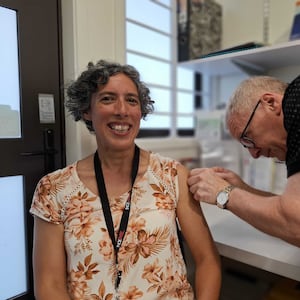
News
October 31, 2025
Drive to tackle Northland’s low vaccination rate as measles outbreak continues
Health officials say Kiwis aged 32 to 56 are likely to need a second MMR vaccination.
Northland health authorities are ramping up efforts to combat the region's lagging vaccination rates as a measles outbreak continues to pose a significant public health threat. While the specific number of cases hasn't been disclosed, the outbreak underscores the urgent need to improve immunization coverage, particularly within vulnerable age groups. Health officials are expressing concern that a significant portion of the population is not adequately protected against this highly contagious and potentially dangerous disease.
A key focus of the renewed drive is to target individuals aged 32 to 56, who health officials believe are likely to require a second dose of the Measles, Mumps, and Rubella (MMR) vaccine. This recommendation stems from the historical context of vaccination schedules. During the time this age group was growing up, a single dose of the MMR vaccine was the standard practice. Current guidelines recommend two doses for optimal and long-lasting immunity.
The single dose, while providing some protection, may not be sufficient to confer lifelong immunity against measles, especially in the face of a persistent outbreak. Consequently, individuals in this age bracket are now considered more susceptible to infection.
Health officials are urging anyone unsure of their vaccination status to contact their general practitioner or local health clinic. Checking vaccination records is a simple process, and getting vaccinated is a safe and effective way to protect oneself, their families, and the wider community.
The push to improve vaccination rates in Northland involves a multi-pronged approach. Public health nurses are actively engaging with communities to provide information and address any concerns about the MMR vaccine. Outreach clinics are being planned in accessible locations to make vaccination more convenient for residents. Educational campaigns are also being launched to raise awareness about the seriousness of measles and the importance of vaccination.
Measles is a highly infectious viral disease that can cause serious complications, including pneumonia, encephalitis (swelling of the brain), and even death. It spreads easily through the air when an infected person coughs or sneezes. Symptoms include fever, cough, runny nose, and a characteristic rash. Vaccination remains the most effective way to prevent measles and its complications.
A key focus of the renewed drive is to target individuals aged 32 to 56, who health officials believe are likely to require a second dose of the Measles, Mumps, and Rubella (MMR) vaccine. This recommendation stems from the historical context of vaccination schedules. During the time this age group was growing up, a single dose of the MMR vaccine was the standard practice. Current guidelines recommend two doses for optimal and long-lasting immunity.
The single dose, while providing some protection, may not be sufficient to confer lifelong immunity against measles, especially in the face of a persistent outbreak. Consequently, individuals in this age bracket are now considered more susceptible to infection.
Health officials are urging anyone unsure of their vaccination status to contact their general practitioner or local health clinic. Checking vaccination records is a simple process, and getting vaccinated is a safe and effective way to protect oneself, their families, and the wider community.
The push to improve vaccination rates in Northland involves a multi-pronged approach. Public health nurses are actively engaging with communities to provide information and address any concerns about the MMR vaccine. Outreach clinics are being planned in accessible locations to make vaccination more convenient for residents. Educational campaigns are also being launched to raise awareness about the seriousness of measles and the importance of vaccination.
Measles is a highly infectious viral disease that can cause serious complications, including pneumonia, encephalitis (swelling of the brain), and even death. It spreads easily through the air when an infected person coughs or sneezes. Symptoms include fever, cough, runny nose, and a characteristic rash. Vaccination remains the most effective way to prevent measles and its complications.
Category:
Politics